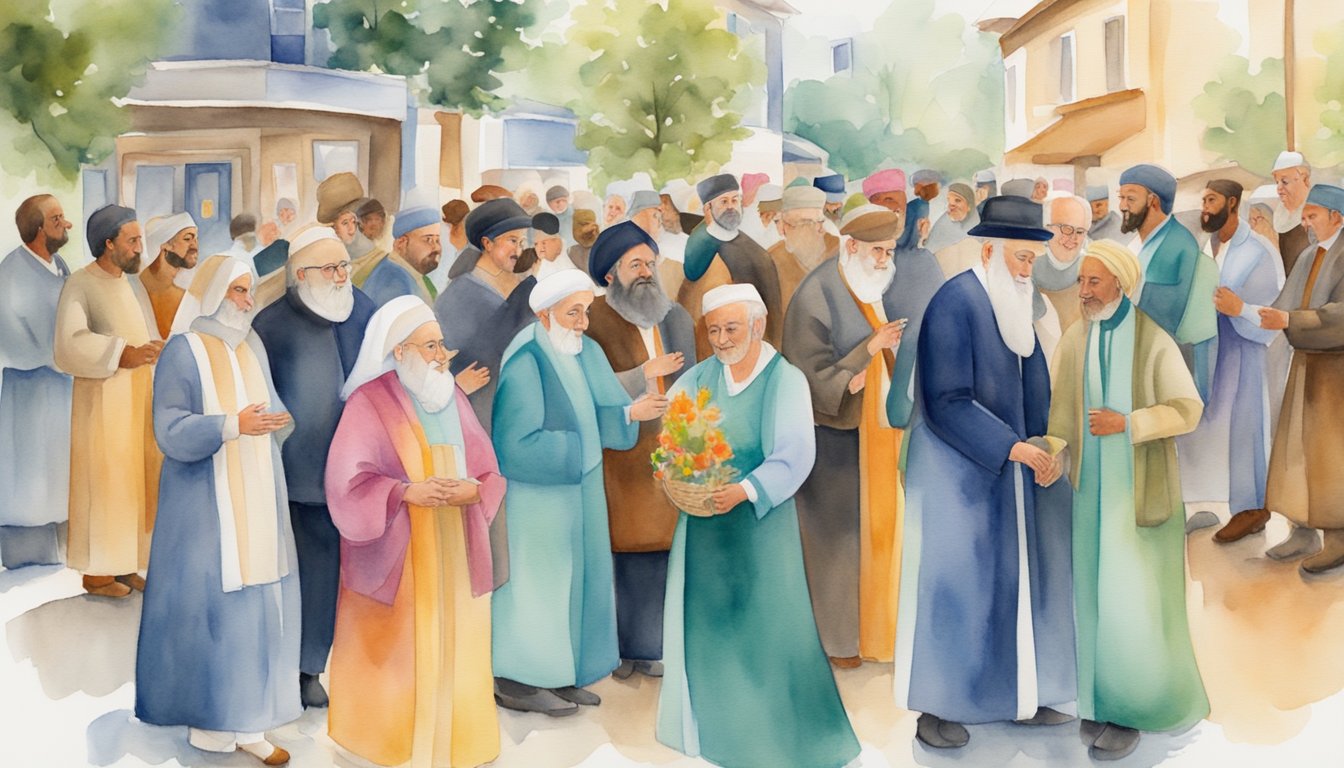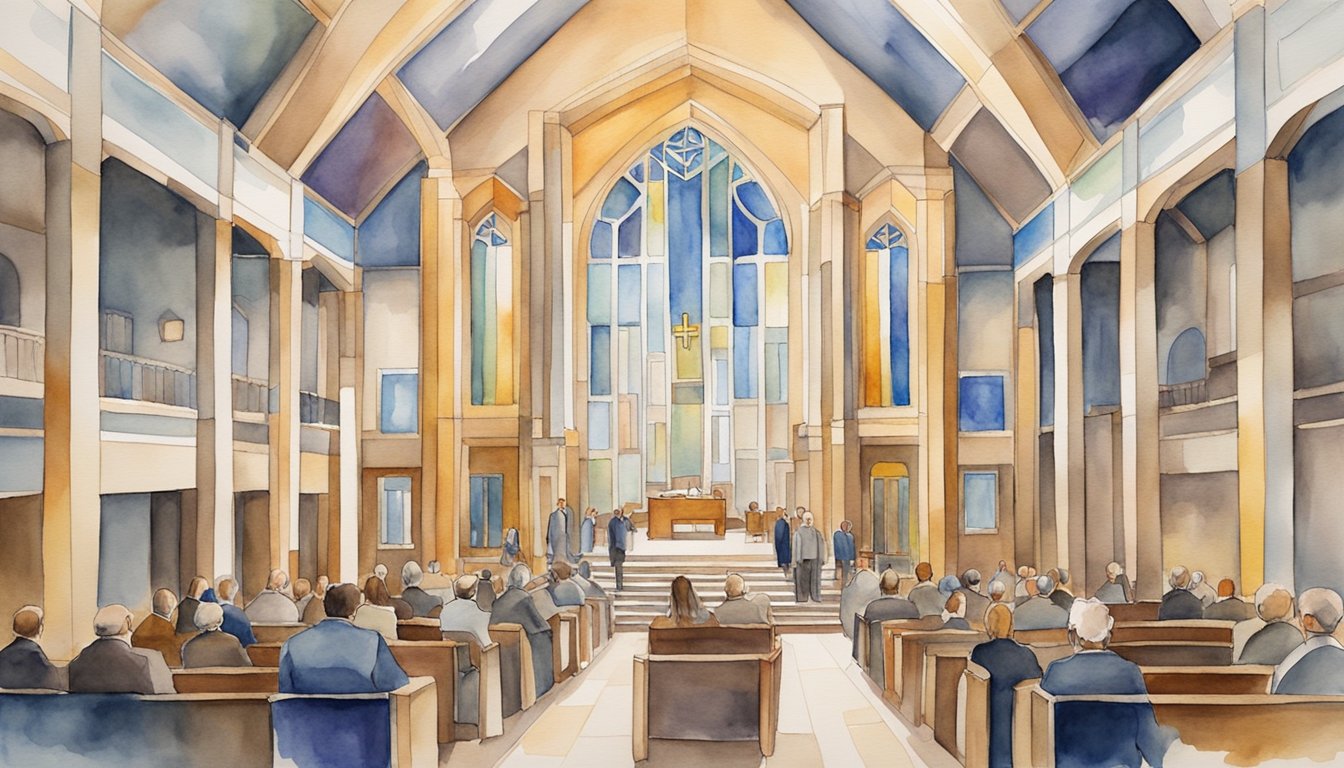Origins and Categories of Jewish Denominations
The complex tapestry of Jewish denominations is characterized by a rich history and diverse expressions of Jewish law and tradition. From strict observance to liberal interpretations, these streams have evolved over centuries into movements that signify various approaches to Judaism.
Orthodox Judaism
Orthodox Judaism maintains a commitment to traditional Jewish law and customs, viewing them as divine and unalterable. There are several subgroups within Orthodox Judaism, including Ultra-Orthodox, Hasidic, and Modern Orthodox. The Ultra-Orthodox and Hasidic Jews adhere to a rigid lifestyle with a strong emphasis on community and the guidance of their Rebbe, or spiritual leader. They often live in tight-knit communities where preserving traditions is paramount. In contrast, Modern Orthodox Jews integrate their adherence to Jewish law with an engagement in modern society.
- Hasidic Judaism: Hasidic Jews follow the teachings of 18th-century mystics who emphasized personal experiences of God and the joyful expression of faith.
- Sephardic and Mizrahi Orthodox Jews: The Sephardic and Mizrahi traditions originate from Jews from Spain, Portugal, the Middle East, and North Africa, combining strict observance with unique local customs.
Reform Judaism
Reform Judaism emerged in the 19th century as a response to the Enlightenment and modernity, offering a more liberal approach to religious practice. Emphasizing individual autonomy, this movement adapts Jewish traditions and practices in line with contemporary life and values. It represents the largest Jewish denomination in the United States and actively seeks to integrate innovation while preserving core Jewish values.
- Traditions: While keeping a connection to Jewish traditions, Reform Judaism allows for flexibility in interpretation and practice.
- Jewish Law: In Reform Judaism, Jewish law is viewed as a set of guidelines rather than binding commandments, and individuals may decide which traditions to observe.
American Jewish denominations: A social and religious profile
Conservative Judaism
Conservative Judaism, or Masorti Judaism outside of the United States, arose in the late 19th and early 20th centuries. It posits a middle ground between Orthodox and Reform Judaism, seeking to conserve Jewish traditions while being open to modern scholarship and change. This movement emphasizes a historical and dynamic view of Jewish law, which can be adapted while remaining true to traditional Halacha (Jewish law).
- Jewish Law and Observance: Jewish law is binding, but its interpretation can evolve through the decisions of religious authorities.
- Balance: Conservative Judaism strives for a balanced approach that values traditional practices and the realities of contemporary life.
The American jewish periphery: An overview
Cultural and Community Aspects

Jewish denominations not only shape religious practice but also deeply influence cultural and community dynamics. From the role of women to the arts and political engagement, each aspect contributes to the fabric of Jewish life across the world.
Role of Women in Jewish Denominations
In many Jewish denominations, women have seen a transformative shift in their roles, especially in progressive streams where they participate equally in religious rituals. For instance, Jewish Renewal and some branches of American Judaism actively support female rabbis and gender equality in synagogue life. These changes reflect a broader trend in North America and Israel, where women’s involvement in family and community religious practices is evolving.
Jewish Education and the Arts
Jewish education serves as a cornerstone of community life, fostering a deep connection with Jewish culture, tradition, and the arts. Across Europe, the United States, and Israel, institutions combine traditional studies of Torah and Talmud with a rich offering in arts and culture, from music to visual arts that explore and celebrate Jewish identity. Educational settings often serve as incubators for cultural expression, allowing Jewish customs to thrive through creative mediums.
Influence of Politics and Society
Politics and social values within Jewish denominations reflect a spectrum of views and have a profound impact on Jewish community affiliations. For example, the interplay between Jewish tradition and society’s pressing issues, such as intermarriage, informs the community’s approach to inclusion and outreach. Synagogues and Jewish organizations in the United States and Israel frequently engage in dialogue and activism rooted in Jewish ethics, demonstrating the symbiotic relationship between faith-based values and societal progress.
Contemporary Issues and Future Directions

The Jewish denominational landscape is facing shifting paradigms due to evolving beliefs and interdenominational dynamics. These shifts are challenging the cohesion among groups and shaping Jewish identity in the modern age.
Challenges of Interdenominational Relations
Interdenominational relations within Judaism have always been complex. Current trends show a contemporary scene where cooperation and conflict coexist. Issues such as intermarriage and the role of Jewish law within different subgroups create friction. For instance, while Reform Judaism is known for its liberal stance, allowing patrilineal descent, the Orthodox tradition strictly adheres to matrilineal descent. This divergence often leads to disputes regarding who is a Jew, impacting family and community dynamics. Dati (religious) Jews and secular subgroups further complicate these relations, as do cultural differences among Ashkenazi Jews from Eastern Europe and Mizrahi Jews with roots in Yemen and Spain.
Jewish Denominations and Identity Politics
Identity politics plays a significant role in shaping the Jewish denominational landscape. Jewish identity is multifaceted, involving elements of religion, culture, and ancestry. Denominations must grapple with how to maintain traditions and customs while addressing contemporary moral and ethical concerns. Jewish education’s influence on denomination and identity formation is crucial — it can either promote a transdenominational unity or deepen divisions. As denominations confront modern issues like LGBTQ+ inclusion and the challenges of a counterculture, defining what essential aspects of Jewish culture and Jewish law are negotiable becomes increasingly complex. Additionally, the historical trauma of the Holocaust remains a central point around which Jewish identity coalesces, influencing religious observance and the way justice and meaning are interpreted within each denomination.

